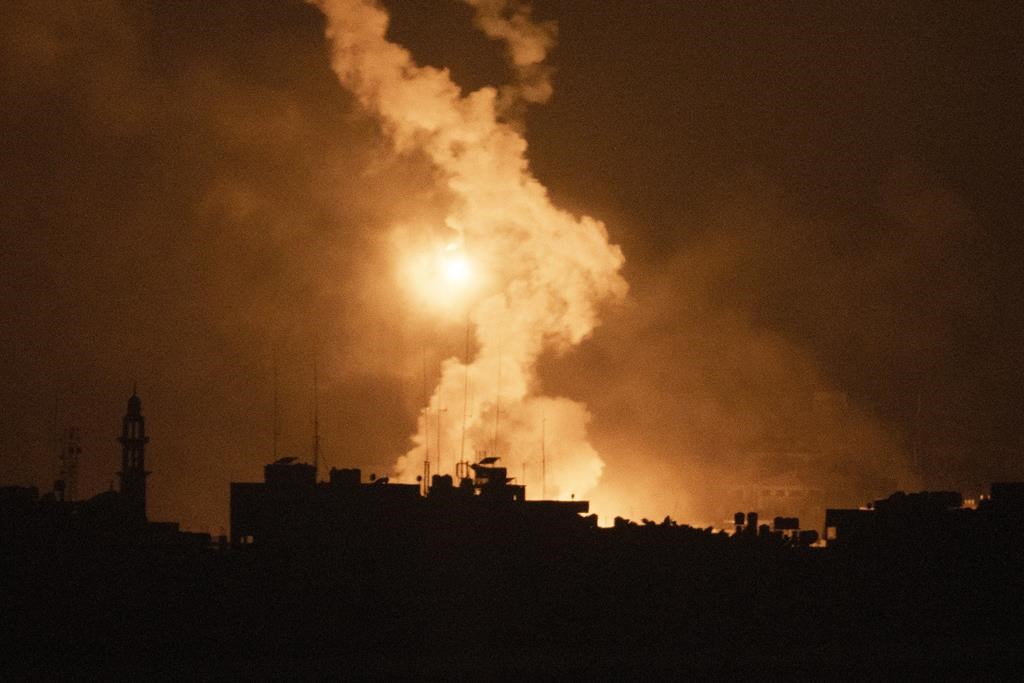A student group issues a statement condemning Israel and defending the Palestinian right to resistance, and the university administration pushes back, accusing the students of being out of step with the institution’s values.

It’s a tension that has surfaced on many campuses – in Canada and abroad – since the outbreak of the Israel-Hamas war on Oct. 7, but at York University, the friction has stirred up long-standing issues on a campus that has for decades faced criticism from Jewish and pro-Israel groups over its messaging on the Middle East conflict.
The standoff between three student unions representing all graduates and undergraduates at York has also triggered debate about the limits of free speech on campus.
The latest tensions began simmering with an Oct. 12 statement from the unions, expressing “solidarity with Palestine.”
The statement — which came less than a week after Hamas fighters stormed into Israeli communities in a brutal rampage that killed an estimated 1,200 people, including children — called the Oct. 7 attack “a strong act of resistance” by the Palestinian people, while affirming their right to “self-determination and liberation.”
The administration at York condemned the statement “unequivocally,” demanded the student union leaders resign and launched a review to determine if they breached their responsibilities.
“Freedom of expression has limits and comes with responsibilities. It must never reach into promoting or justifying violence against unarmed civilians,” York wrote in a statement.
“To suggest otherwise is abhorrent and does not reflect the views of York University, nor the perspective of many thousands of York University students.”
In an Oct. 31 Instagram post, the York Federation of Students that represents more than 50,000 undergraduates said that “demanding resignations of democratically elected students, threatening students right to organize and speak out against injustice is an unprecedented attack by university administration.”

Get daily National news
Representatives of the three unions who co-signed the statement did not respond to interview requests.
But Brandon Rhéal Amyot, the international chairperson of the Canadian Federation of Students, defended the York union, arguing student groups have historically “played a really crucial role in dismantling systems of oppression.”
“As a student movement we have a role to play in fighting against settler colonialism,” said Amyot.
Similar disputes have played out at other universities amid the Israel-Hamas war, which has seen Israel unleash a bombardment of Gaza that has killed more than 11,000 people, two-thirds of them women and minors, according to the Health Ministry of the Hamas-run territory.
At Toronto Metropolitan University, a group of law students posted a letter praising “all forms of Palestinian resistance,” following Hamas’s Oct. 7 attack, which also saw the militant group drag back an estimated 240 hostages into Gaza.
The Lincoln Alexander School of Law issued a rebuttal to say the letter “does not represent the views of our law school.”
On Nov. 7, the school hired retired judge J. Michael MacDonald to review events surrounding the Oct. 20 letter and assess whether the university’s Student Code of Non-Academic Conduct was breached “and, if so, what actions are appropriate.”
The director of the centre for free expression at TMU, James Turk, commenting only on the tensions at York University, said that “when it comes to free speech, you have a right to say what you want as long as it’s not contrary to the law.”
“Nothing the students said is contrary to the law in Canada,” Turk said.
“The York administration has every right to say it finds the unions reprehensible and that it disagrees with their statement,” he added, noting the reciprocal nature of free speech, but said a review process that could strip away recognition of the three unions would be problematic.
“What crosses the line and undermines free expression is when they then try to censor.”
For York, the ordeal has rekindled familiar campus tensions.
The law firm Diamond and Diamond has filed a $15-million class-action lawsuit against the university, undergraduate student union and the student centre alleging a pattern of antisemitic incidents dating back to 1998.
The statement of claim alleges a proliferation of “anti-Israel propaganda” on campus, including a “pro-Palestine mural plastered over an entrance at York University’s student centre.” It alleges such actions have partially fuelled tensions that result in Jewish students feeling targeted by their peers.
“Jewish organizations have been reaching out to York University over the years, pleading and begging them to stop and intervene, which all fell on deaf ears. Nothing has been able to change them,” Sandra Zisckind of Diamond and Diamond told The Canadian Press.
In a statement responding to the lawsuit, York said it “unequivocally condemns all forms of discrimination and hate, including antisemitism and Islamophobia.”
Robert Mawaka, a member of the York chapter of the Jewish student organization Hillel, said the university administration’s pushback against the York Federation of Students was a positive step.
“For the first time, I feel heard as a Jewish student. They are finally taking a stance about what’s happening,” Mawaka said.







Comments
Want to discuss? Please read our Commenting Policy first.